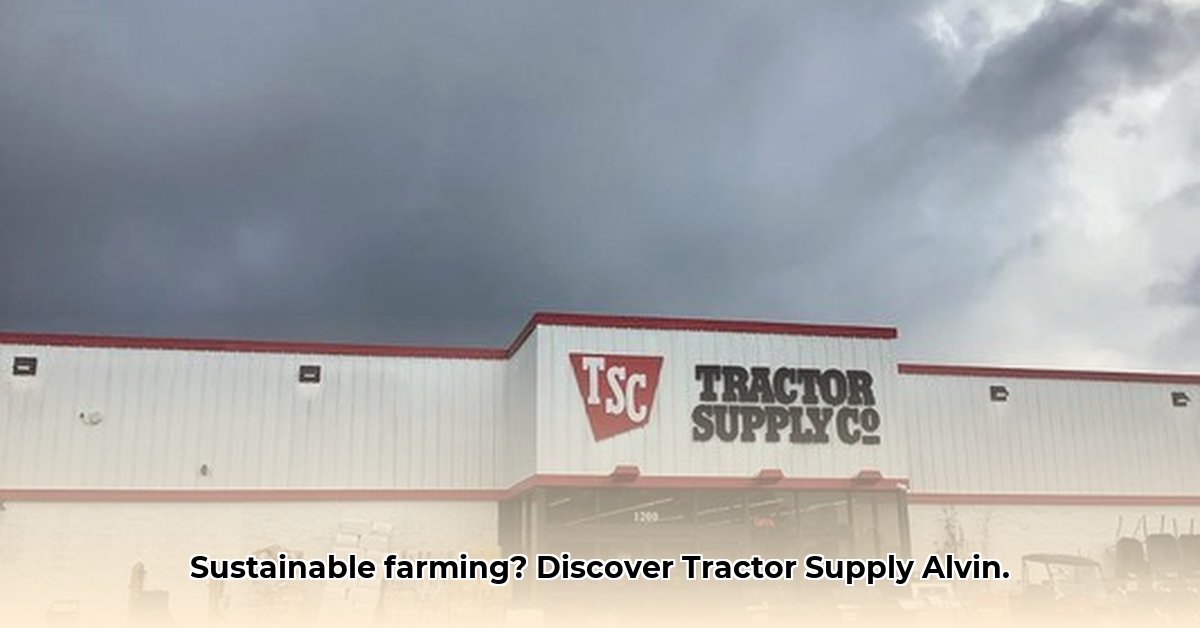
Tractor Supply Alvin: Assessing its Role in Sustainable Agriculture
Tractor Supply Company (TSC) in Alvin, Texas, serves a wide customer base, including residents of nearby towns like Friendswood, Webster, and Pearland. Its convenient location makes it accessible to both large-scale farmers and home gardeners. However, its contribution to sustainable agriculture in the region requires closer examination. While TSC offers a diverse range of products – from farm equipment and livestock feed to gardening tools and pet supplies – the extent of its commitment to sustainable practices needs further clarification. How readily accessible are organic seeds, water-efficient irrigation systems, and eco-friendly fertilizers? This article investigates TSC’s role, highlighting opportunities for improvement and outlining actionable steps for all stakeholders. For more information on TSC Alvin, visit the store page.
Sustainable Practices: An Analysis of Product Availability
TSC Alvin's inventory includes many tools potentially useful for sustainable farming. However, the prominence and variety of genuinely sustainable options remain unclear. For example, what percentage of their fertilizer selection is truly environmentally benign? Are certified organic seeds readily available and prominently displayed, or are they tucked away less visibly? A comprehensive audit of their supply chain, detailing product origins and waste management strategies, would greatly enhance transparency and build consumer trust. This is a crucial first step in evaluating their actual contribution to sustainable agriculture. How many customers actively seek out these products? That's a key question needing further data.
Sustainable Agriculture: A Collaborative Approach
Building a robust sustainable agricultural system in Alvin necessitates collaborative efforts from multiple stakeholders. Their individual roles and responsibilities are outlined below:
Tractor Supply Alvin's Role
- Short-Term Goals (Within 1 Year): Conduct a thorough supply chain audit, publicly disclosing product origins and waste management practices. This boosts transparency and builds trust.
- Long-Term Vision (3-5 Years): Partner with local, sustainable farmers to directly source and stock their products. Implement eco-conscious business practices, such as reducing packaging waste and improving energy efficiency.
The Role of Local Farmers
- Short-Term Actions: Actively explore TSC Alvin's inventory for sustainable options. Provide feedback to the store regarding product gaps and unmet needs.
- Long-Term Engagement: Advocate for a wider selection of sustainable products and request educational workshops or resources from TSC.
Consumers: Driving Demand for Sustainable Products
- Short-Term Steps: Prioritize products with eco-certifications (e.g., organic labels). Inquire about product sourcing and sustainability practices directly at the store.
- Long-Term Commitment: Support businesses that prioritize environmental responsibility through conscious purchasing decisions. This sends a powerful market signal.
Local Government: Encouraging Sustainable Practices
- Short-Term Initiatives: Encourage TSC and other local businesses to participate in sustainability initiatives. Publicly acknowledge and highlight businesses committed to sustainable agriculture.
- Long-Term Strategies: Implement policies incentivizing sustainable farming practices, such as tax breaks or grants for eco-friendly initiatives.
Addressing Potential Challenges: A Risk Assessment
Several factors could hinder the adoption of sustainable agriculture in Alvin. A risk assessment reveals key challenges and potential mitigation strategies:
| Risk Factor | Likelihood | Impact | Mitigation Strategy |
|---|---|---|---|
| Limited supply of sustainable products | Moderate | Moderate | Increased consumer demand and partnerships with local sustainable farms can encourage TSC to expand its offerings. |
| Low consumer awareness of sustainable practices | High | Low | Educational campaigns and collaborations with local organizations can raise awareness. |
| Increased competition from other retailers | Moderate | Moderate | TSC can differentiate itself by offering unique sustainable products and engaging with the community. |
| Unexpected changes in environmental regulations | Low | High | Proactive monitoring of regulatory changes and adaptation of business practices is crucial. |
Conclusion: A Collaborative Path Towards Sustainability
The realization of a truly sustainable agricultural system in Alvin hinges on the collaborative efforts of all stakeholders. Open communication, a shared vision, and a commitment to making sustainable practices the norm are crucial. By working together, Alvin can create a thriving, environmentally responsible agricultural landscape. Further research and transparency from TSC regarding their commitment to sustainable products are essential components of this collective effort.